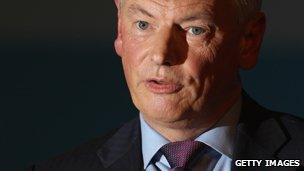Will the 2011 census be the last in the current format?
- Published

In opposition, Francis Maude described the census as "wasteful" and "intrusive"
The census has been a feature of British life since 1801, but it now costs the taxpayer £482m and takes years to plan. Could the 2011 census be the last of its kind?
A snapshot of Britain in 2021: CCTV cameras blink and swivel on every high-street lamp post or railway platform. Electronic travelcards map our journeys. Credit cards track our spending habits. Smartphones pinpoint our whereabouts scores of times a day, as supermarkets scrutinise our diets.
Meanwhile, buried deep in some hangar-sized bunker at an unknown location, hundreds of servers store the personal details of every member of the population - our addresses, our phone numbers, our employers, partners and children. How we get to work, the state of our health. Even the sort of central heating in our homes.
In fact, the answer to every question the law-abiding among us have recently answered - under threat of a £1,000 fine - in the 2011 census questionnaire.
This vision - not so much the Big Society as Big Brother run amok - might seem far-fetched, but it is no mere fantasy.
From the Royal Mail to our NHS records, from the DVLA data to the electoral roll, government (local and national) and private corporations, such as credit reference agencies, already hold a vast amount of personal data about us all.
And, as Radio 4's The Report has discovered, some fear the scope of such captured data is set to widen yet further.
Britain's 2011 census is all but certain to be the last of its sort. The £482m cost - in an age of austerity - has prompted the government to seek urgent, radical and more cost-effective alternatives.
In opposition, the Conservatives made clear their disdain for both what they saw as the cash-devouring census "machine", and the unnecessarily invasive nature of some of the questions.
"Given the ruinous state of the public finances, we do not believe that the 2011 census can have the size and scope that has been proposed, particularly since we believe that many of the proposed questions are unsuitable," wrote Nick Hurd, MP, then shadow minister for the Cabinet Office, to Sir Michael Scholar, the head of the UK Statistics Authority, in 2009.
Alternatives
However, when they came to power, ministers were informed by civil servants that reducing the scale of the census - stopping the juggernaut near journey's end, in effect - would render it "ineffective or worse".
Reluctantly, the government gave the Office for National Statistics (ONS) - which conducts the census in England and Wales - the green light.
The apparent U-turn dismayed some loyal Conservative party supporters such as Alex Deane, who sits on the advisory council of Big Brother Watch, a pressure group which fights state intrusion into privacy.
"I think a lot of the things this government is doing are tremendous," he said.
"But this, I'm afraid, shows an out-and-out surrender to the bureaucrats, and a reversal of principle from one that was clearly stated and is now clearly abandoned."
Neither the government nor the ONS will say anything publicly while this year's census is still being processed, but the race is on to find new ways to collect data.
And the clock is ticking. A committee called "Beyond 2011" is already considering a number of options, we have been told. These include:
An e-version
A rolling census which would survey 10% of the population every year (instead of 100% every decade)
The aggregation of existing tax, benefit, education, medical and even credit agency data
A hybrid model, which would mix a rolling survey of, perhaps, 2% of UK postcodes, with existing data
Pete Benton, deputy director of the census, was prepared to admit that the ONS would "take a very good look at the existing data the government already holds, and see whether we can use that to produce the required statistics".
'Dangerous'
"It's certainly possible that in the future we might provide census-type information from existing data sources," he added.
Cabinet Office minister Francis Maude has said, external that compiling information from existing state and private data stores would produce "more accurate, much more timely data in real time".
"There's a load of data out there in loads of different places."
Such a move would almost certainly cut costs over time - but it is also likely to entail creating a nationwide database.
In the age of Wikileaks and all-too-frequent data security breaches, that is a development which worries some, including Oxford University's Dr Ian Brown, who specialises in public policy issues around information and the internet.
"I think the idea of the government building a mega-database with continually flowing information from other government departments will be very dangerous for privacy," he said.
"There would be such temptation for the government to use that data for all sorts of other purposes."
In the scramble to find an alternative system, money may be saved. But by the time of the next census in 2021, our expectations of privacy might have to change as well.
The Report will be broadcast on Thursday 28 April at 2000 BST on BBC Radio 4. You can listen again via the iPlayer or download the podcast.
- Published6 April 2011
- Published1 February 2011
- Published10 July 2010